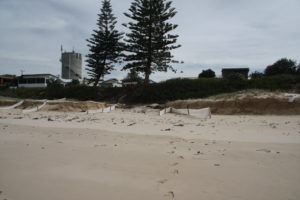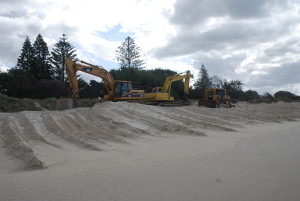First, the Bad News.
Almost eight months ago we published Heads in the Sand. This story highlighted DuneCare’s need for help to quickly bolster the fore dune which, after protecting Wooli many times, was badly damaged by major storms in quick succession. Unfortunately, Clarence Valley Council (CVC) refused our request to use beach scraping even though this is a proven, inexpensive and widely used solution to this problem.
However, Council’s refusal was quickly shown to be a major error when shortly afterwards the (then) Environment Minister, Rob Stokes, strongly supported scraping in his speech to the NSW Coastal Conference. He followed this up by saying he would shortly write to the Council recommending and offering funding for beach scraping at Wooli.
So what’s the bad news in that you ask? Well, just before he wrote to CVC he was caught up in the recent reshuffle of the NSW Government and lost the Environment Portfolio. The major impacts on Wooli were:
- Council’s continued refusal to help rebuild our fore dune leaving Wooli exposed to upcoming Winter’s storms and
- a further six month delay in Ministerial approval of Wooli’s coastal management plan (CZMP) which aims to provide longer term protection of the beach.
Fortunately, the tide then started turning (pun intended) in Wooli’s favour when the new Environment Minister, Gabrielle Upton, was appointed.
CCPA quickly enlisted the help of Clarence MP, Chris Gulaptis, in arranging a meeting with her to go over these issues. Like Chris, our new CVC Mayor, Jim Simmons, also showed his support for Wooli by agreeing to a senior council manager, Des Schroder, joining us in attending the meeting thereby presenting a combined community and council view to Minister Upton.
 So the Good News is, following the June 1st meeting, the Minister has taken two important steps:
So the Good News is, following the June 1st meeting, the Minister has taken two important steps:
- She has written to CVC supporting beach scraping at Wooli without the need for either an approved CZMP or further environmental studies and with funding being immediately available and
- Confirmed she would prioritise making a decision on whether or not to approve our CZMP. The Coastal Panel had earlier recommended against approving it until Council does several more studies (resulting in a major delay) while we and the council recommended approving it now, with any critical studies to be included in its first stage. We suspect the Minister’s decision may still be weeks away, hopefully not months.
After eight months of delays these steps make it feel like the force is with us again and Wooli’s future is being dug out of government limbo. Let’s leave our fingers crossed because the fore dune is still damaged, the storm season is still coming and the CZMP is not yet approved.


 Well those two storms in June brought this fear very much to the fore as the fore dune lost about half its sand and the foot of the main dune was exposed in several places. As that article foreshadowed “..Based on very experienced independent advice, the CCPA steering committee has begun the next step of working with the Council to have a beach scraping plan pre-approved and pre-funded so as to be ready when it’s needed to quickly repair the fore dune.”
Well those two storms in June brought this fear very much to the fore as the fore dune lost about half its sand and the foot of the main dune was exposed in several places. As that article foreshadowed “..Based on very experienced independent advice, the CCPA steering committee has begun the next step of working with the Council to have a beach scraping plan pre-approved and pre-funded so as to be ready when it’s needed to quickly repair the fore dune.”



 The title of this article is part of a recent quote from Brad Hazzard, NSW Minister for the Department of Planning and Infrastructure,
The title of this article is part of a recent quote from Brad Hazzard, NSW Minister for the Department of Planning and Infrastructure, has decided to follow State advice and “jump away from the doomsday scenario” in their coastal planning. Unfortunately, as you’ll see in that article Clarence Valley Council (CVC) continues to treat 86-year modelling forecasts as clear-and-present-danger in their Coastal Zone Management Plans, including the one for Wooli beach. Comparing the beach today to the dire forecast in this
has decided to follow State advice and “jump away from the doomsday scenario” in their coastal planning. Unfortunately, as you’ll see in that article Clarence Valley Council (CVC) continues to treat 86-year modelling forecasts as clear-and-present-danger in their Coastal Zone Management Plans, including the one for Wooli beach. Comparing the beach today to the dire forecast in this  Coastal Hotspot communities understand that coastal management is a complex problem for all our councils and one they are struggling to manage as highlighted in this
Coastal Hotspot communities understand that coastal management is a complex problem for all our councils and one they are struggling to manage as highlighted in this  councils and coastal communities alike.
councils and coastal communities alike. While we understand that the previous state government compelled local councils to use these figures back in 2010, it appears that CVC is reluctant to disregard them when drafting current CZMP ‘s, despite some convincing grounds for doubt informing the debate.
While we understand that the previous state government compelled local councils to use these figures back in 2010, it appears that CVC is reluctant to disregard them when drafting current CZMP ‘s, despite some convincing grounds for doubt informing the debate. lawyers and local and state government bureaucrats to accept the IPCC predictions to reduce legal risk, and told they could bear personal liability if the council were sued. But Eaton says that, as a lawyer himself, he has carefully analysed the issues and decided the council would still have the defence that it had acted in good faith because the Labor-era requirement to rely on the IPCC guidelines had been scrapped. “We threw out the sea-level rise crap,” Eaton says.
lawyers and local and state government bureaucrats to accept the IPCC predictions to reduce legal risk, and told they could bear personal liability if the council were sued. But Eaton says that, as a lawyer himself, he has carefully analysed the issues and decided the council would still have the defence that it had acted in good faith because the Labor-era requirement to rely on the IPCC guidelines had been scrapped. “We threw out the sea-level rise crap,” Eaton says.